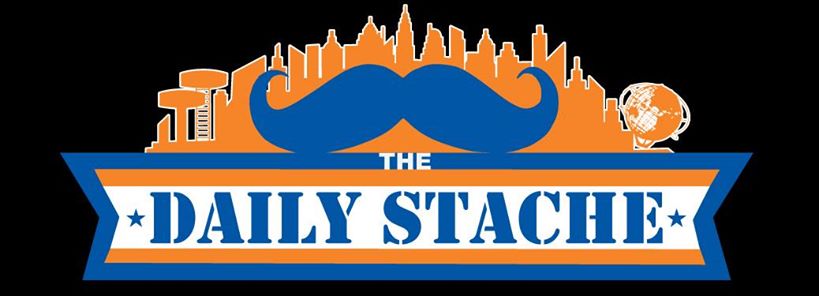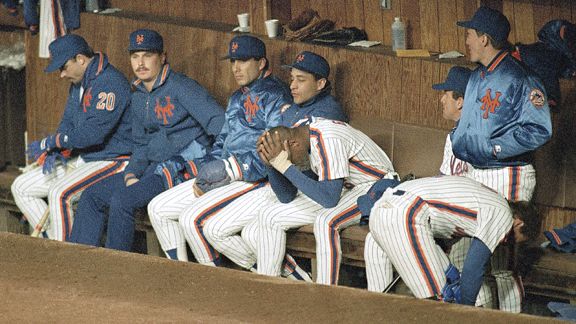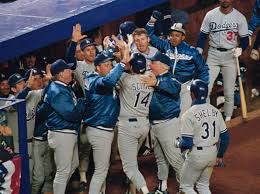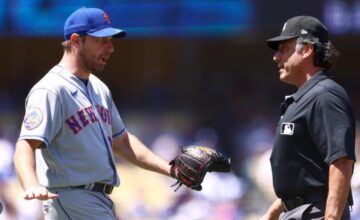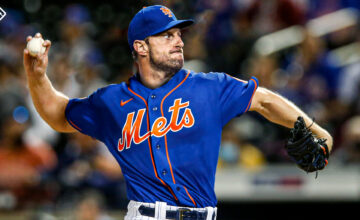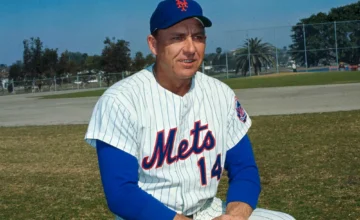by Taryn “the Coop” Cooper
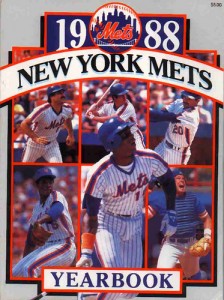
Despite the general success of the 1988 team, it was seriously one of the worst years to be a Mets fan.
Many Mets fans immerse themselves in Mets history because…well, sometimes looking at the past is a lot more fun than focusing on the present day. Although, I don’t think our present day is anything to shake a stick at. In fact, I think I have a little more than just a tempered enthusiasm going into 2015.
That’s not to say that reflecting on the past isn’t at all painful. There’s a reason why I’ve coined the term “Post-traumatic Mets Disorder.” Sometimes, the mere mention of years, whether they are connected to discussion on the Mets is enough to summon our vomiting reflexes.
Last week, I was a guest on the Rising Apple podcast. Turns out it was their 90th episode, and they usually focus on either a year or a uniform number. Since no Met has been linked to the number 90, we discussed the year 1990.
If you were around to root for the Mets those days, this was kind of the apex of the hey day of those late-1980s Mets. At that point, many of the players who were critical to that 1986 championship had either aged out or had left the team. It was also the last year that Darryl Strawberry was a Met, when he left town to join the Los Angeles Dodgers, his hometown team. We also later found out that Straw, along with homegrown pitching phenomenon Doc Gooden, were so deep into drugs and alcohol, it really helped signify the downtown of those late-80s teams.
However, it wasn’t so much the year 1990 that set me off. It was that whole argument about how “Well the Mets were SO good, if there was ONLY a wild card in that era…” Et cetera, et cetera. And it was true though: if there was a wild car situation, the Mets would have had it.
Also, what was curious about 1990 was not just who won the NL East – former divisional rivals, Pittsburgh Pirates – but who was the league MVP that year. Barry Bonds was the star on the Pirates those years, and with good reason. In 1990, he hit .301, hit 33 home runs and 114 RBIs.
What got me is not that he won the MVP. With those types of numbers, he should have. However, with his team winning the NL East, he certainly wasn’t the only player who helped. Pirates teammate Bobby Bonilla (yes, that guy) hit .280 with 32 home runs and 120 RBIs.
If the logic put towards Kevin McReynolds and Darryl Strawberry in 1988 was that both being good on the first place team actually cancelled their MVP votes (and a less deserving Kirk Gibson won the award that year), shouldn’t the same be said about Bonds and Bonilla in 1990? Why would one of those players win the MVP on a first place team when they put up similar numbers?
Ladies and gentleman, welcome to my world of Post-traumatic Mets Disorder.
See, I have many moments that support my Mets group therapy course work. The year 2006 killed me. Endy Chavez’s catch sends me into a spiral. Losing Shea Stadium in 2008. Everth Cabrera in 2009 (I was AT that game in San Diego too). Bobby Bonilla getting paid nearly 20 years after he’s even played a game for the Mets.
Nothing sets me off more, than with the successful failure of 1988, though. It’s one of those years that while everything on the surface seemed to go right…at the end, it didn’t matter because they had no business losing that series.
Let’s start with the beginning of that season. The New York Mets had a score to settle. The year 1987 was wrecked with injuries. They simply could not carry the momentum from the 1986 team. The major trade that offseason going into 1987 was Kevin Mitchell for Kevin McReynolds. There was another character involved in that trade (Gene Walter, anyone?), but Mitchell was a spark plug who was a major personality addition to the wild and crazy ’86 team. McReynolds comes in and treats baseball like a jay-oh-bee. Twenty-something years later, it’s evident with players who just go in and do their jobs. It’s less about the flash and love of the game. And when you have ownership who values “milquetoast” players over rock-n-roll type guys, it’s easy for Mets historians to see that this shift took place with that trade.
Not that McReynolds wasn’t a good Met. He was frickin awesome. He worked hard, and you knew what you were going to get from him (more like a Daniel Murphy type, but with good defense). You could count on him to hit .270 every year and drive in nearly 100 runs. I always remembered him getting absolute clutch hits too. I also remember him in 1988 saying that whether the Mets won or lost game seven of the 1988 playoffs, it was a win-win for him. If they won, he got to go to the World Series. If he lost, he’d get to go duck hunting.
No wonder fans didn’t quite warm up to him.
Darryl Strawberry was heralded as the “black Ted Williams” of his day. He had such a sweet home run stroke, and a name made for New York media (Strawberry Sundae night, anyone?), he was a quick fan favorite. Straw has a great redemption story NOW, but in 1988 he put up some of the best numbers of his career. He hit 39 home runs, 101 RBIs. The Mets won 100 games that year. He was as critical to the team winning, and without him there, the Mets were a completely different team in ’88.
That’s not how the media saw him. See, Straw and “Big Mac” were seen as “complementary” players, and I suppose the argument was that the team would’ve won with or without one of those guys. That reasoning, however, drives me INSANE to this day. I will always maintain that Strawberry was robbed of the MVP that year, especially when Kirk Gibson hit 25 home runs and 76 RBIs. That’s not even good for a team that LOST the division, let alone a team that won the NL West that year.
And by that mentality, Darryl Strawberry should have won the NL MVP in 1990, not Barry Bonds, nor Bobby Bonilla who ranked 2nd in voting that year. Because Strawberry meant more to his team than Bonds or Bonilla did.
Prior to the 1986 season, general manager Frank Cashen orchestrated a trade for Bobby Ojeda, current Mets fan-favorite, and 1986 18-game winner. He was also a former Red Sox, and loathed the team he used to play for. Talk about payback in that World Series. The guy showed up when the team needed him to.
However, in 1988, he decided to do some “hedge trimming” the night the Mets clinched a tie for the division. I use the term “hedge trimming” very loosely because it was rumored that Ojeda partied a little too hard that evening with the team, and slammed his finger in the door.
The regular season was a cake walk for the Mets. They won 100 games. The NL West champions, the Los Angeles Dodgers, won 94 games. During the regular season, the Mets OWNED the Dodgers, going 10-1 against them. After game three in the NLCS, it looked like the rout of L.A. would continue (especially when Bart Giamatti tossed Jay Howell out for a tar ball). My dad had a ticket to game four. I begged him to take me. It was a chilly October night, those type of fall nights where you try to catch an errant breeze by keeping your windows open…but you also need an extra blanket in case it gets too cold. With Dwight Gooden on the mound and the Mets winning in the 9th, what could possibly go wrong?
Well, Mike Scioscia to be exact, who hits a game tying home run in the bottom of the ninth. Extra innings later…the series is tied, 2-2. The Mets go back to Dodger Stadium, trailing 3-2 in the series. Well, that wasn’t supposed to happen.
The other little tidbit that the Dodgers had besides their faux MVP Gibson was their Cy Young Award winner, Orel Hershiser. Hershiser ended the season with 59 scoreless innings…and Mets starter David Cone had BETTER numbers than him overall. Cone went 20-3 with a 2.22 ERA. Cone had a BETTER ERA than Hershiser, even with him throwing 59 consecutive scoreless innings! The worst part?? Cone wasn’t even the second overall Cy Young Award winner, it was Danny Jackson of the Cincinnati Reds who won 23 games that year.
Are you feeling the same thing I am, that the Mets, despite all their success and genuinely talented players, just did not get the respect from the writers they should have?
Speaking of writing, David Cone was a guest columnist for the Daily News during the NLCS. He wrote some trash talk about Hershiser and most of the Dodgers, in general.
“I’ll tell you a secret: As soon as we got Orel out of the game, we knew we’d beat the Dodgers,” Cone continued. “Knew it even after Jay Howell had struck out HoJo (Howard Johnson). We saw Howell throwing curveball after curveball and we were thinking: ‘This is the Dodgers’ idea of a stopper?’ Our idea is Randy (Myers), a guy who can blow you away with his heat. Seeing Howell and his curveball reminded us of a high school pitcher.”
The 25-year old Cone proved too big for his britches. Because after those statements, well, the Dodgers had ammo.
They may have had an overrated 30 year old started in Hershiser, who had a good month in that season. The Dodgers had crusty veterans like Gibson, who scored a lot of runs, and Mike Marshall, who actually drove in MORE runs than MVP Gibson. They also had lovable Uncle Tommy Lasorda leading their charge.
On paper, the 1988 Mets should have done more. I had a podcast in April devoted to Post-Traumatic Mets Disorder. Featuring the one and only Metstradamus, we talked about different points of Mets history that hurt. I know Scioscia’s home run hurt, but the year 1988 was shameful from beginning to end.
Having two potential MVP candidates “cancel out votes” when just two seasons later, that same thinking wasn’t applied to the MVP that year. A Cy Young Award candidate finished third to a pitcher who had a good MONTH and another one who happened to win three more games. The future generation of pitching Doc Gooden had not won a postseason game as a Met. And as I mentioned in my PTMD podcast, the Mike Scioscia home run changed the course of baseball forever. We’d have never heard of Kirk Gibson’s home run heroics against the Oakland A’s. Tommy Lasorda wouldn’t be legendary World Champion manager of 1988.
All because the New York Mets made 1988 the WORST SEASON EVER.
The late 1980s Mets should have been more successful. Their only championship in that era was 1986, now 28 years ago. If there had been a Wild Card, they would have made the playoffs more in the ’80s. By the time Barry Bonds and Bobby Bonilla did not cancel out MVP notes in 1990, the Mets 1980s hoo-rah had ended.
When we look at the Mets history throughout the years, 1988 was the denouement, the falling action that had leveled out and led to the Worst Team Money Can Buy.
